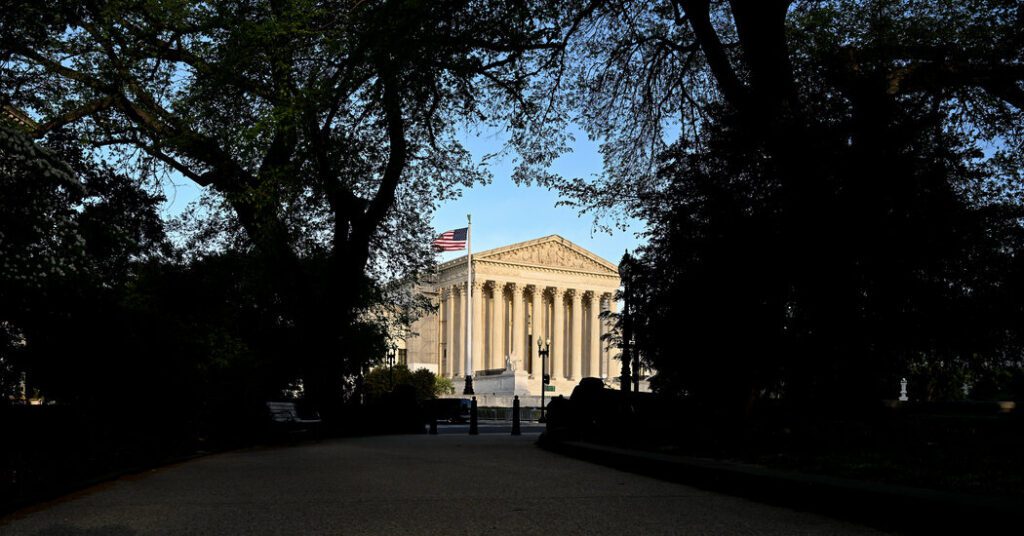The Supreme Court docket on Monday averted a definitive decision of challenges to legal guidelines in Florida and Texas that curb the facility of social media firms to average content material, leaving in limbo an effort by Republicans who’ve promoted such laws to treatment what they are saying is a bias towards conservatives.
As an alternative, the justices unanimously agreed to return the instances to decrease courts for evaluation. Within the majority opinion, Justice Elena Kagan wrote that neither decrease appeals court docket had correctly analyzed the First Modification challenges to the Florida and Texas legal guidelines.
The legal guidelines had been prompted partially by the selections of some platforms to bar President Donald J. Trump after the Jan. 6, 2021, assault on the Capitol.
Supporters of the legal guidelines mentioned they had been an try and fight what they known as Silicon Valley censorship. The legal guidelines, they added, fostered free speech, giving the general public entry to all factors of view.
Opponents mentioned the legal guidelines trampled on the platforms’ personal First Modification rights and would flip them into cesspools of filth, hate and lies.
The 2 legal guidelines differ of their particulars. Florida’s prevents the platforms from completely barring candidates for political workplace within the state, whereas Texas’ prohibits the platforms from eradicating any content material primarily based on a person’s viewpoint.
“To generalize only a bit,” Decide Andrew S. Oldham of the U.S. Court docket of Appeals for the Fifth Circuit wrote in a choice upholding the Texas legislation, the Florida legislation “prohibits all censorship of some audio system,” whereas the one from Texas “prohibits some censorship of all audio system” when primarily based on the views they categorical.
The 2 commerce associations difficult the state legal guidelines — NetChoice and the Laptop & Communications Trade Affiliation — mentioned that the actions Decide Oldham known as censorship had been editorial judgments protected by the First Modification, which typically prohibits authorities restrictions on speech primarily based on content material and viewpoint.
The teams mentioned that social media firms had been entitled to the identical constitutional protections loved by newspapers, that are typically free to publish with out authorities interference.
Federal appeals courts reached conflicting conclusions in 2022 in regards to the constitutionality of the 2 legal guidelines.
A divided three-judge panel of the Fifth Circuit reversed a decrease court docket’s order blocking the Texas legislation.
“We reject the platforms’ try and extract a freewheeling censorship proper from the Structure’s free speech assure,” Decide Oldham wrote for almost all. “The platforms should not newspapers. Their censorship isn’t speech.”
However a unanimous three-judge panel of the U.S. Court docket of Appeals for the eleventh Circuit largely upheld a preliminary injunction blocking Florida’s legislation.
“Social media platforms train editorial judgment that’s inherently expressive,” Decide Kevin C. Newsom wrote for the panel. “When platforms select to take away customers or posts, deprioritize content material in viewers’ feeds or search outcomes or sanction breaches of their group requirements, they have interaction in First Modification-protected exercise.”
The Biden administration supported the social media firms within the two instances, Moody v. NetChoice, No. 22-277, and NetChoice v. Paxton, No. 22-555.
A ruling that tech platforms don’t have any editorial discretion to determine which posts to permit would have uncovered customers to a better number of viewpoints however virtually definitely amplify the ugliest facets of the digital age, together with hate speech and disinformation.
The Supreme Court docket drew on two key precedents to find out the place to attract the constitutional line.
Considered one of them, Pruneyard Buying Heart v. Robins, from 1980, involved a sprawling non-public purchasing heart in Campbell, Calif., whose 21 acres included 65 outlets, 10 eating places and a movie show. It was open to the general public however didn’t allow, as Justice William H. Rehnquist put it in his opinion for the court docket, “any publicly expressive exercise, together with the circulation of petitions, that’s not immediately associated to its business functions.”
That coverage was challenged by highschool college students who opposed a U.N. decision towards Zionism and had been stopped from handing out pamphlets and looking for signatures for a petition.
Justice Rehnquist, who could be elevated to chief justice in 1986, wrote that state constitutional provisions requiring the purchasing heart to permit folks to have interaction in expressive actions on its property didn’t violate the middle’s First Modification rights.
Within the second case, Miami Herald v. Tornillo, the Supreme Court docket in 1974 struck down a Florida legislation that will have allowed politicians a “proper to answer” to newspaper articles essential of them.
The case was introduced by Pat L. Tornillo, who was sad about colourful editorials in The Miami Herald opposing his candidacy for the Florida Home of Representatives. The newspaper mentioned Mr. Tornillo, a labor union official, had engaged in “shakedown statesmanship.”
Chief Justice Warren E. Burger, writing for a unanimous court docket in putting down the legislation, mentioned that “the huge accumulations of unreviewable energy within the trendy media empire” didn’t allow the federal government to usurp the function of editors in deciding what should be printed.



